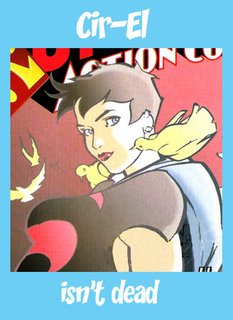My own theory was that the talk of David Cain training other girls was a clue, and that this chatty villain was going to turn out to be Cassie's evil twin. I mean it obviously wasn't Cass.
Sadly, I find that my guess was wrong and that it was Cass; just a very badly written Cass, who behaved and talked nothing like the character I knew.
But somewhere up at DC, whoever was responsible for this villainisation got overruled and Teen Titans #43 gives us an explanation that allows Cass to return to the good guys' team. It's a bad explanation, which doesn't begin to cover the changes that were made to her in Robin, and it's all about abuse and mind control, but I see a lot of fans happy to accept it because it gives them Cass back.
This in turn has prompted a reaction to happy feminist fans of Batgirl that can be summed up as "Oh, so it's okay to have a story of abuse towards women when it suits you, is it?" To which the answer is "No, but this bad thing fixed something that was worse. We do not cheer the bad fix, we cheer that the worse thing is gone."
 In other Batgirl news, I'm intrigued to find announcement of a Showcase Presents Batgirl collection. This is an innovative move on the part of DC collecting the adventures of a character who never had their own strip*. So Yay! to DC for thinking outside the box, but a Wha? for picking this as their first collection starring a female character, and when there are so many great silver age comics waiting on dusty shelves that are being passed over in favour of obscure war comics and this collection of guest appearances.
In other Batgirl news, I'm intrigued to find announcement of a Showcase Presents Batgirl collection. This is an innovative move on the part of DC collecting the adventures of a character who never had their own strip*. So Yay! to DC for thinking outside the box, but a Wha? for picking this as their first collection starring a female character, and when there are so many great silver age comics waiting on dusty shelves that are being passed over in favour of obscure war comics and this collection of guest appearances.Which is not to say that I won't be first in the queue for this book. It's a great collection and contains one of my favourite silver age comics ever.
*Okay, she did have a brief solo strip in the anthology Batman Family title, but it's not included in this collection.




